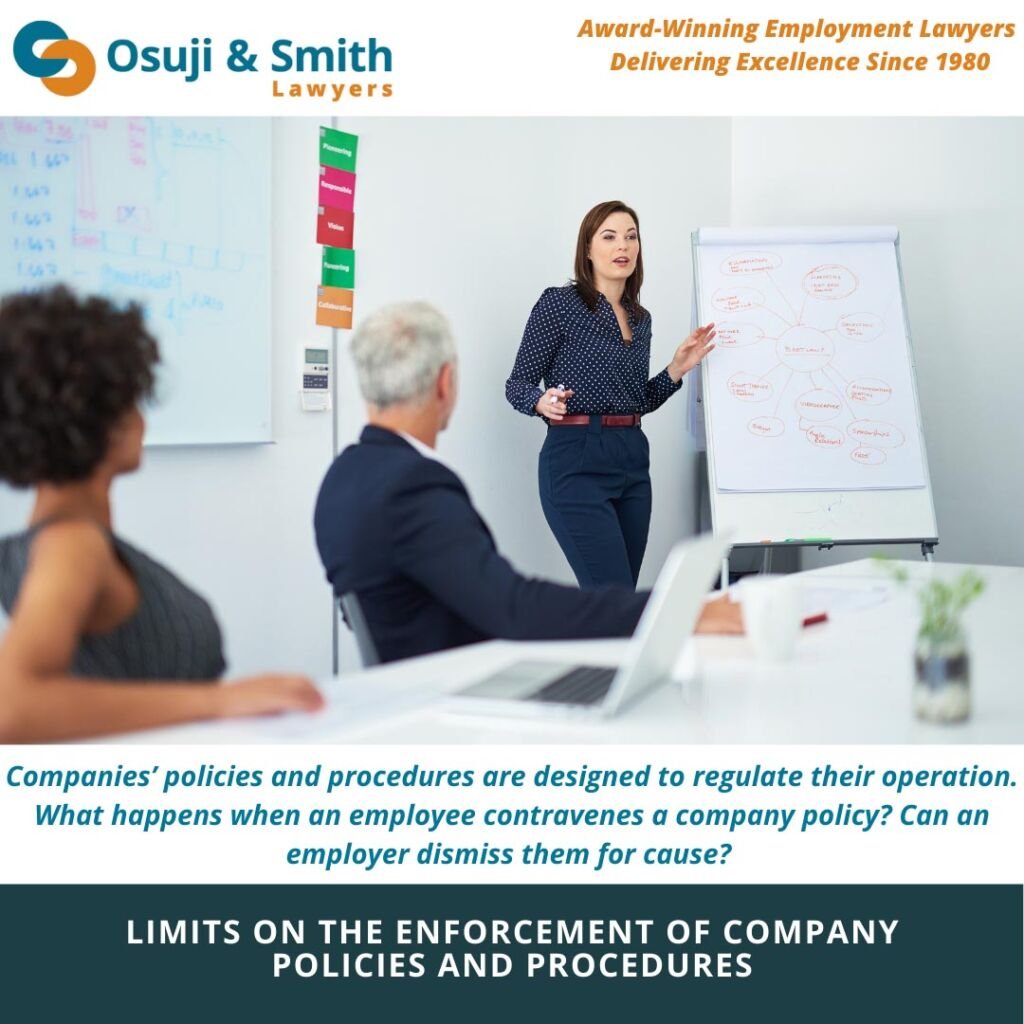Limits on the enforcement of company policies and procedures
Companies’ policies and procedures are designed to regulate their operation. What happens when an employee contravenes a company policy? Can an employer dismiss them for cause? Also, is there a difference between the enforcement of policies that guide general workplace standards, such as dress code, social media use, etc., and those that form part of the employee employment contract, such as severance? This article will provide some insight into these questions.
General policies that set workplace standards

The court has stated that “employers have the right to set ethical, professional, and operational standards for their workplaces. Doing so not only falls within an employer’s management rights, but it also constitutes an integral component of good corporate governance.” – Poliquin V Devon Canada Corp (2009 ABCA 216)
Generally, if violated by an employee, policies of this kind cannot lead to termination for cause by the employer. The court will ask questions such as: is it consistent with the employee’s employment contract? Is it severe enough to warrant the proposed consequence? Is the policy clear and unambiguous, etc. – Asurion Canada Inc V Brown and Cormier (2013 NBCA 13)
In the Poliquin case, an employee was dismissed for cause for receiving free services from suppliers, accessing inappropriate materials on the internet, and sending improper emails to co-workers, all contrary to the company’s general policy. The court considered questions akin to the above and agreed that a dismissal for cause was a fair consequence for the employee’s misconduct and dismissed his wrongful dismissal suit.
In the instance of zero-tolerance policies, in the context of dismissal for cause, the court will still look into several contextual factors surrounding the alleged misconduct before it decides whether to enforce a zero-tolerance policy or not. So an employer’s right to dismiss an employee for contravening a zero-tolerance policy is not absolute.
Policies that are in an employee’s employment contract
Policies that contain essential terms for employment, e.g., policies regarding severance, are usually made within the framework of an employment contract where all the four elements of a contract are present, i.e., a concluded agreement, consideration, and contractual intention. The employee must be aware, and agree to the enforceability of, these policies; they must be consistently enforced by the employer and must be supported by consideration. Suppose the employer wants to change any of these essential terms or policies, they must inform the employee and provide fresh consideration to enforce them—failing which the new policy will likely be unenforceable.
The case of Smith v. Vauxhall Co-Op Petroleum Limited 2017 ABQB 525 crystalizes this point where the court stated that further, fresh consideration is not required to make changes to day-to-day workplace policies binding on the employee; it is only required when the change in policy purports to alter a fundamental term of their employment agreement. Changes that can affect severance, bonuses, etc. will require fresh consideration
Policies must be clear and unambiguous
With regards to ambiguity in the recent case of Rice v. Shell Global Solutions Canada Inc, 2021 ABCA 408, the court stated that an employee was entitled to a more extended notice on their dismissal without cause even when the employer argued that the term “assignment for four years” did not mean employment for fixed-term of four years but in line with their company policy, the term referred to the length of a project to which the employee was assigned, within the employee’s indefinite employment. The court found that the term the employer assumed was commonplace knowledge within the company was not clear and unambiguous enough for the employee to not conclude that it meant employment for a fixed term of 4 years. And when such ambiguity arises, the court usually decides the case against the drafter of the document and the more powerful party, the employer, and they did so in this case.
Conclusion
Employers should ensure that the policies they consider essential to the employment are contained in the employment contract or referenced in the employment contract, and that they are clear and unambiguous to the employee. Policies and procedures should be reasonable, and the consequences for breach should be clearly stated and enforced consistently. Employees can bring a wrongful dismissal claim against an employer for a for-cause dismissal if they are not satisfied that the policy that resulted in their dismissal was enforceable.
Employers should periodically review their company or business policies to avoid common pitfalls. Employees have the right to question the enforceability of policies and procedures that impact them.
Get in touch with our Calgary employment lawyers at Osuji & Smith Lawyers for more on this.
Author: Juliette Omonigho


